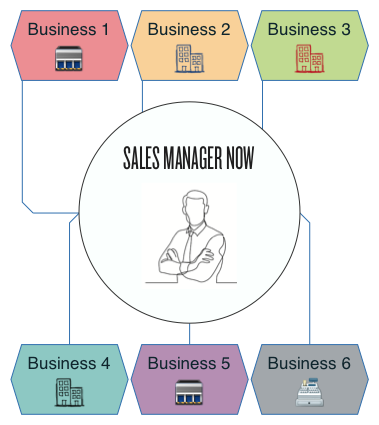Our firm began practicing fractional sales management in early 2006, and nearly twenty years later,…

Is Fractional Sales Leadership Right for Your Business?
Exploring Fractional Sales Leadership
If your business has made it past the ten-year mark, it wouldn’t be uncommon for you to feel the strain of inconsistent sales and a hardworking team that isn’t hitting the mark. It might feel like a temporary slowdown—a lousy quarter….or two, but the reality is you’ve hit a sales ceiling and are unsure how to move forward. The methods that once worked aren’t cutting it, and if you lack a sales background, your leadership might feel less effective.
You’ve considered hiring a sales leader, but finding the right fit within your budget and culture is challenging. While the fear of stagnation is real, you’re determined to push forward. A fractional sales leader could bring the expertise and structure needed to break through.
Let’s explore fractional sales leadership, its facets, and its numerous benefits for your business.
What is a fractional sales leader?
A fractional sales leader is an experienced sales professional who can lead small business sales teams through acute and chronic sales challenges.
Like any good sales leader, they lead the sales team through effective management and inspirational leadership, taking care of the necessary details of the sales department and challenging the sales team to improve to the level the company needs.
They bring insight and experience to discern what valid internal issues need to be addressed and what might be salespeople exaggerating. They share their time and expertise with a few companies, providing clients with a broader view of the sales environment for less than half the cost of a full-time sales leader.
Expert/savvy fractional sales leaders want to align with a company’s culture and not disrupt what’s been working. They focus on building on strengths and adjusting to moving past the current and future sales challenges a growing company faces.
Like other fractional leadership disciplines, the practice of fractional sales leadership is growing. During the COVID-19 pandemic, the work-from-home trend boosted the acceptance of remote work, leading to greater acceptance of fractional leaders and managers.
With the boom of fractional leaders in the market and no governing body or certification, anyone can call themselves a fractional leader, and you’ll need to discern if they are what you need. This article is written to help you with your decision and provide information on how we at Sales Manager Now practice fractional sales leadership.
Fractional sales leader or a fractional sales manager?
Is there a difference? Yes and no.
It’s common for a sales leader in a mid-to-enterprise company to be focused on vision and strategy. They stay above the noise of working with salespeople day in and day out. They review data, identify trends, and make decisions that set a course and vision for the sales manager and their team.
A sales manager reports to the sales leaders, who understand that clear expectations and processes known and followed by all lead to an accountable sales environment. The sales manager works closely with the salespeople, coaching, encouraging, and challenging them. The sales manager establishes stability to make room for implementing new processes and strategies that support team improvement and increased sales. A good manager keeps calm by listening to the salespeople and being their advocate to the sales leader or CEO.
The ideal small business fractional sales leader will be a strong sales leader and manager. They understand the importance of sharing the company vision, providing clear direction, and ensuring all processes and systems are documented and easily understood. CRMs and reports must align with expectations, and process and sales meetings offer room for improvement and accountability.
Ideal Small Business Fractional Sales Leadership
Sales Leader Practices
- Shares the company vision with the sales team and establishes team responsibility for meeting and exceeding goals.
- Listens for obstacles and opportunities to fix or take advantage of.
- Empower others to allow them to grow and contribute more to the company.
- Inspires the team through their positive belief in the team and company.
- Converses with the salespeople in a manner that demonstrates they care.
- Will define new initiatives that can move the sales team toward goals and vision.
- Collaborates with other company leaders/managers to support the company’s greater good.
- Defines the attitude, activity, and conversations required to meet and exceed goals.
Sales Manager Practices
- Defines, documents, and communicates clear expectations and team guidelines.
- Aligns expectations with process and reporting.
- Develops an accountable sales environment and confronts and manages poor performance.
- Maintains a consistent cadence of sales meetings and one-on-one coaching.
- Advocates for the sales team to help improve processes, communication, and systems.
- Is accountable for the implementation of processes and new initiatives.
- Deals with difficult conversations with the sales team and other leaders supporting company objectives.
- Coaches the sales team to improve activity, attitude, and conversations to win more business.
Titles and labels are less important than what fractional sales leadership will provide to an organization. At Sales Manager Now, we label our service Fractional Sales Management because implementing strategy, process, and initiatives is where the rubber meets the road.
Implementing current strategies is often more critical in Small businesses than developing new ideas or updated visions. Progress is made when the sales team implements what has been decided. That said, to scale and grow, the leader’s perspective and energy are required, which is why at Sales Manager Now, each of our leaders provides a combination of leadership and management.
Types of fractional sales leader roles and their focus
The fractional sales leadership industry is still developing and being defined. There are no agreed-upon industry standards, roles, or titles that any fractional leader must live up to. Sales Manager Now has been practicing fractional sales leadership since 2006, but we have only labeled ourselves as fractional sales managers since 2022.
So, in full transparency, the roles and responsibilities listed below are this author’s opinion and have been described to provide small business owners guidance to help with their selection process if they run into leaders who use these titles. Also, since the following roles are more specific and can all fall within being a fractional sales leader, I’ve presented what the traditional full-time role is commonly responsible for to provide more objective descriptions.
Fractional Chief Sales Officer – Suppose the fractional sales leader has experience as a chief sales officer. In that case, they are accustomed to a top executive (c-level) role in a growth-oriented organization with direct and indirect sales channels and, more than likely, many regional or international groups. They are counted on for strategic direction and coordination between all sales channels to maximize sales initiatives that align with the company’s vision. As an executive, they leverage support staff to accomplish the mission assigned.
Other responsibilities for a CSO include:
- Strategic Sales Leadership.
- Revenue Growth and Profitability
- Sales Organization Design and Structure
- Team Leadership and Culture
- Cross-Functional Alignment and Collaboration
- Data-Driven Forecasting and Reporting
- Process and Efficiency Optimization
- Customer and Market Insight
- Budgeting and Resource Allocation
- Risk Management and Compliance
Fractional Sales VP – The role of a VP of Sales oversees all aspects of the sales effort and could be reporting to the CSO. A full-time role is found in mid-sized to enterprise organizations and rarely in small businesses. Suppose a fractional is titled as a Sales VP. In that case, they should have experience with all of the following and are accustomed to having a support staff or resources available to them to deliver on the responsibilities below:
- Driving revenue growth
- Management of the sales team
- Aligning sales strategies with company objectives
- Team leadership and development
- Sales Process and Performance Optimization
- Collaborating with other company leaders
- Budgeting and resource allocation
- Forecasting and reporting
- Market intelligence and competitive analysis
- Customer relationship management
Fractional Head of Sales – The Head of Sales role aligns better with small business sales leadership as it carries more direct management responsibility. The Head of Sales is crucial in executing the company’s sales plan, driving team performance, and ensuring the department operates effectively to meet revenue goals. This role typically sits below the Chief Sales Officer (CSO) in larger organizations, or it can function as the senior-most sales leader in smaller companies. Responsibilities include:
- Sales Strategy Execution
- Team Leadership and Development
- Revenue and Goal Management
- Sales Process Optimization
- Cross-Departmental Collaboration
- Sales Forecasting and Reporting
- Market and Customer Insight
- Budget and Resource Management
- Customer Relationship Management
- Sales Training and Enablement
Fractional Director of Sales – The Director of Sales is often responsible for leading a specific segment of the sales organization, typically managing regional or departmental sales teams, and ensuring they meet or exceed targets. The Director of Sales role is traditionally more hands-on than a VP or Head of Sales, often with a closer focus on execution, team performance, and achieving specific revenue objectives. This role could lend to a better fit with small businesses if they are comfortable in a smaller organization. Responsibilities for a Director of Sales:
- Sales Strategy Development
- Team Leadership and Development
- Revenue Forecasting and Budgeting
- Sales Process Optimization
- Relationship Management
- Performance Metrics and Reporting
- Market and Competitor Analysis
- Product and Pricing Strategy
Fractional Sales Manager – A fractional sales manager will more often be willing to roll up their sleeves alongside others in the company while leading and keeping the department organized. A fractional sales manager provides sales leadership in a small business that a business owner can lean on when making decisions. Similar to a head of sales, they provide hands-on management for a company’s sales team without the commitment of a full-time position. A Fractional Sales Manager has been a standard role in the fractional management industry for almost twenty years. We have been practicing this role at Sales Manager Now since 2006.
Want to understand this role in depth? Check out our deep dive into Fractional Sales Management.
The role is responsible and accountable for the sales team development, goal attainment, and aligning all sales processes and activities with the company’s short and long-term goals and vision.
Responsibilities for a Fractional Sales Manager include:
- Sales Strategy Development
- Sales Process Improvement
- Team Leadership and Training
- Goal Setting and Performance Management
- Sales Metrics and Reporting
- Interim or Transitional Leadership
- Collaboration with Other Departments
- Lead Weekly Sales Meetings
- Sales Tools and CRM Optimization
- Budget and Resource Management
A fractional sales manager provides strategic and operational sales support with the option of a short or long-term sales leadership solution, making them valuable for companies looking to grow sales, improve processes, and establish a strong sales foundation.
Expected outcomes and ROI
The expected impact of hiring a fractional sales leader is increased sales. This can happen quickly if you have the right salespeople or longer if turnover is required.
Once sales improve, the ongoing effect is consistent production that meets or exceeds goals. Still, the most significant effect and greatest return on investment is when a fractional sales leader impacts the long-term value of your business. This can take more time, usually between 12 and 24 months.
When your sales department can prove they have repeatable processes that others can lead and manage, your sales department is now a significant contributor to your business value. Being able to plug and play good people in when others leave is what the healthiest businesses achieve. That is what Fractional Sales Leaders and Sales Manager Now focus on.
Fractional Sales Leader ROI Case Study
For example, when a 70-year-old family-run insurance agency called to help develop the next generation of successful agents and support family succession, the agency had three senior brokers. It had been turning over new producers with a full-time sales manager. Ten years later, the agency went from three retiring brokers with a business of close to 4 million dollars to a younger group of six agents managing a book of business of 10 million. Why did it take the agency 70 years to start scaling? I never asked, but things changed during Sales Manager Now’s tenure as their fractional sales leader.
The family-run business had been led by motivated family members but had yet to learn how to bring in and develop agents outside the family. They leaned on those they knew they could trust over strangers who they could develop and trust. The younger sales team we worked with was trained to consistently add new clients each year while maintaining their book of business. They transitioned from a cold-calling team to a referral-generating team.
We instilled in them and they understood that employment was not just an opportunity to earn a good living; they were counted on and responsible for growing the client base each year. Our firm managed this team for nine years, and the agents we developed maintained habits that have sustained the growth.
What has suffered after our departure is the continuation of hiring and developing new agents to continue the desired growth. Developing additional salespeople and sales revenue per rep requires a sales leader who will lead, accept, and deliver on the desired growth goals.
Fractional sales leaders are only part of the sales growth equation. Sales growth is a total company effort, and the growth at the insurance agency was realized with the support and leadership of the company’s CEO. He fully supported our sales leadership and co-managed sales by providing industry knowledge and experience to the younger agents. We were never licensed as an insurance agent, so we never went on sales calls with the agents. If the knowledge is in the building to educate the sales team, a fractional sales leader can manage attitude, activity, accountability, and conversations.
How to find the right fractional sales leader
Evaluating and contracting with a fractional sales leader differs from hiring an employee. A fractional leader is focused and accountable to results rather than time. While there will be some time commitments for meetings, getting in step, or tuning up, you are not buying hours of their time. You are investing in results and outcomes that have been described previously. Here are some factors to consider.
Relevant Sales Leadership Experience and Industry Knowledge: Ten or more years of sales leadership and management experience is a good benchmark. The term sales manager can be a sales role or a management position. Be sure to clarify their experience during your interview. I look for twenty years of leadership experience when hiring my team of fractional sales leaders.
Industry experience becomes more critical if you require a new strategic direction sooner rather than later. Industry knowledge is less important if your current processes have been working but need improvement.
Fractional Sales Leadership Experience: As mentioned, anyone can be called a fractional manager or leader today. What they deliver is another story.
Understanding how many clients they have worked with is a fair question, as is asking if they have a detailed process that has more than simple title stages. Have them describe what transpired at past clients to help you discern their experience. A great question people ask me is when your service did not work and why.
Their website, YouTube, or LinkedIn presence should also tell you if they are just getting started or experienced in this role. Written articles or blogs are another way to evaluate their approach to leadership.
Balance of Strategic Vision and Tactical Skills: When hiring a small business fractional sales leader, it is essential to find a balance between strategic vision and tactical skills. As described earlier in the matrix, a blend of both will be best.
Leadership Style and Cultural Fit: Evaluating leadership style and cultural fit will be similar to your current employee hiring process. It’s hard to know without checking references or starting to work together. You are interviewing a salesperson, so remember you can easily be sold, so go slow and be sure.
Ask them what their process is when working with a new team. How they describe this process will tell you something about their leadership style. They might be winging it and relying on their personality if they are general or lose you in their explanation. If they have a proven process that is logical, documented, and easy to understand, it tells you they welcome accountability.
To assess cultural fit, invite another leader or partner onto a call to gain more perspective. Some clients are concerned the team might not accept us. In a case like this, we encourage them to schedule a meeting with us and allow us to have a Q and A with the team so they also get a sense of our fit and understand our approach. A fractional should be comfortable with a meeting like this before contracting.
Is a fractional sales leader right for your business?
My perspective is biased, but the benefits of hiring a qualified fractional sales leader have been proven over almost twenty years of practice by myself and the leaders who have joined my fractional team. Below are the key benefits of a fractional sales leader and questions to ask yourself to assess your readiness.
Benefits of a Fractional Sales Leader:
- You are hiring an experienced sales leader who has hired, managed and built high-performing teams. They have been recognized and appreciated in their careers for their leadership.
- You are hiring a leader who would cost 2-3 times more if you hired them full-time, which is unnecessary with a sales team between 2-8.
- You will have someone who is not swept up in the company’s other distractions and can focus on long-term value as well as short-term results.
- The sales leader will develop people at your company who will help it become more robust, and you will receive a better return on their production.
- Sales will improve, and you will gain confidence in what the sales department is doing and who they are working with.
- You can work on other issues at the company that are needed to support more growth.
Company and Owner Traits That Fit Well with a Fractional Sales Leader:
- You would consider yourself leaning toward a trusting and empowering leader more than a micro manager or controlling leader.
- You have the knowledge and resources to help salespeople learn your product or service and answer questions from them as required. (agnostic fractional sales leaders are not product experts)
- The company has growth goals and is willing to provide resources to meet the growth.
- You understand hiring a fractional sales leader is not a quick-fix investment.
Ready to learn more about Sales Manager Now?
If you have a sales team of 2-10 salespeople and think it’s time to decide whether to hire a fractional sales leader, book a meeting with us, and we’ll answer your remaining questions.



